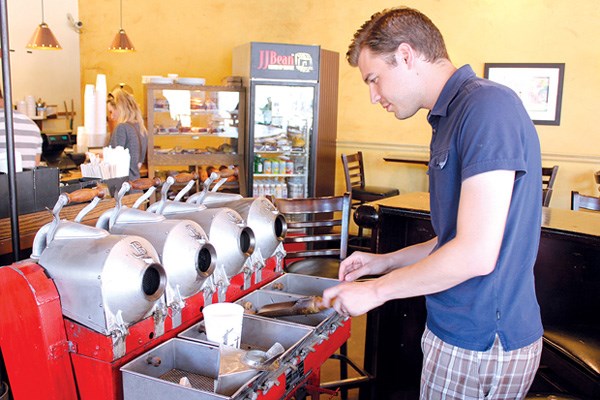BRIAN Turko has set for himself the lofty goal of creating the world's best espresso.
After spending three rousing and informative hours with him one recent morning, I believe he is already well on the way to achieving this goal.
Turko is the co-founder and master roaster of Milano Coffee, a Vancouver mainstay that has spawned multiple offshoot locations, including one on Powell Street deep in the historic brick and mortar lanes of Gastown. It was there that I joined him to learn more about the latest trend to emerge within Vancouver's java culture: the single origin coffee.
As you might expect from someone who lives and breathes espresso, Turko is intense. His narrative wove from one fascinating fact about his industry to another at a pace that made my head swim. As I listened to him describe the complex interplay between the varied flavour profiles of coffee and our sensory responses, I realized two things: firstly, that Turko is a one-of-a-kind coffee savant, part artist, part scientist, with a frighteningly realistic blueprint for global conquest. The second thing I realized is that I knew virtually nothing about coffee, a beverage I nevertheless consume daily.
"It's not about what I tell you is good coffee," said Turko , a 30-year veteran of the coffee business and the man responsible for Milano's gold medal win for their Futura espresso blend at the fourth annual International Coffee Tasting Competition in Italy. "It's about what you think tastes good."
Milano Coffee is one of a growing number of Vancouver purveyors that have embraced the single origin coffee phenomenon, a growing craze among aficionados. In the broadest sense, these are coffees that can be traced back to a single coffee growing region or microclimate. In some cases the beans can even be traced back to a single farm. They present a stark contrast to most of the coffees we consume, which are blends of beans from multiple estates and regions, mixed to complement each other's strengths and mask each other's weaknesses.
For Turko, single estate coffees are vehicles through which consumers can begin to access what he calls the "mouth's IQ," the sum total of factors both sensory and psychological that contribute to our enjoyment of flavours.
"Espresso, which by definition must be a blend, is hedonistic," said Turko. "Its richness appeals to us on a primal level."
This base sensory response cannot be elicited with the same intensity by single origin coffees, Turko argued, but they still serve a vital role as they help us to identify the coffee characteristics that appeal to us the most. Armed with this subjective knowledge we become savvy consumers capable of making educated choices about the coffees we support.
Grady Buhler, quality control leader for JJ Bean Coffee, is also an advocate of single origin coffees. But for Buhler, single origin coffees are complex, satisfying and complete in their own right, displaying the subtleties of their terroirs in ways only rivaled by fine wines.
At JJ Bean's flagship location on Commercial Drive, Buhler recently guided me through the art of "cupping," the globally accepted tasting method of industry professionals. The process involves steeping coffee in a small glass for four minutes, after which time the crust of grounds is broken to release the aromas.
Next comes the tasting component, in which the coffee is slurped from a spoon like a hot soup. The act of exaggerated slurping aerates the coffee and releases its flavours.
I sampled three single estate coffees, each exhibiting surprisingly subtle characteristics. For my money, the most enjoyable cup was the Gethumbwini, a single estate coffee from Kenya. Its notes of fresh blueberries and currants balanced an animal-like gaminess.
"You have to remember that the growing popularity of single estate coffees is great for the farmers as well," said Buhler. "If a farmer's estate has perfect growing conditions it can now be marketed and sold under the estate's own name, giving the farmer unprecedented recognition for his efforts."
Ultimately, Buhler agrees with the notion that enjoyment is the bottom line, irrespective of a coffee's origins. While the market is increasing for single origin coffees, Buhler admits it is still a niche product.
I am fascinated by the single origin phenomenon. The backstories of the coffee estates and farmers make me feel like I am connected to the exotic lands in which the beans were grown.
However, I must admit that I still greatly admire the coffee blender's art. Sipping a single shot of Conca D'oro espresso, painstakingly assembled and brewed by Turko, I felt momentarily transported to a place of pure sensory indulgence. The experience was sublime and indeed primal. Single estate coffees feel more academic to me, rewarding the intellect more than the senses.
Chris Dagenais served as manager for several restaurants downtown and on the North Shore. A self-described wine fanatic, he earned his sommelier diploma in 2001. Contact: [email protected].



